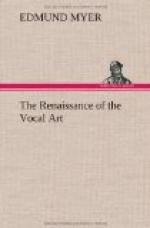Every singer and teacher of singing should, in a certain sense, be an elocutionist as well. Not an elocutionist from the standpoint of many who are called elocutionists, who are stagey, full of mannerisms, and who exaggerate everything pertaining to elocution. Of course the better class of elocutionists are not guilty of these things; but they do idealize everything, whether they read, recite, or declaim, and this in their profession is a mark of true art. So must the teacher and singer learn to idealize not only the tone or the voice, but everything pertaining to the singing of a song. This must be done through the manner in which the sentiment, the thought, the central idea is brought out and presented to the hearer; through the impressive way in which the story is told.
The elocution of singing depends upon a knowledge and control of all the principles considered up to this point of study,—a knowledge and control of physical, mental, and emotional power, of freedom of form and action, of artistic vowel form and automatic articulation, of the removal of all restraint, in fact, of all true conditions of tone. To interpret well, the singer must have mastered the elocution of singing, must be able to bring out every vowel and consonantal element of the words, must know how to use and apply tone color and tone character, the impressive, persuasive, fervent voice. The singer must idealize not only the tone, but the words of the song; “just as the painter idealizes the landscape, so the musical artist must use his powers of idealization in interpreting the work of the composer.” To be able to do this, his diction must be as pure, his language as polished, as that of the most accomplished orator.
The power of word vitality in the singing of a modern song, is one of the great elements of success, if not the greatest. Not an exaggerated form of pronunciation, but an intense, earnest, impressive way of bringing out the thought. It would be interesting to know what per cent of teachers and singers can read properly the words of a song; to know how many of them, or rather how few of them, have ever given this phase of the study, thought or attention. Most of them act as though they were really ashamed to try, when you ask them to read the words of a song, and when they read them, they apparently have no thought of expressing, or no idea of how to express the elevated thought or feeling, necessary to bring out the author’s ideas. It is almost impossible to make them idealize the words through the elocution of singing; and yet in the artistic rendition of a song, a ballad, or a dramatic aria, the words are often of more importance than the music. The singer should study the story of a song by reading it aloud upon the highest plane or level of emotional or dramatic expression. To do this, he must know and apply the elocution of singing. Then he should endeavor to bring out the same lofty ideals when applying the words to the music.




